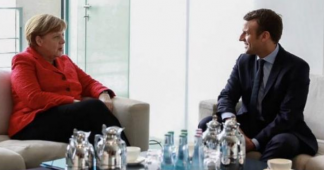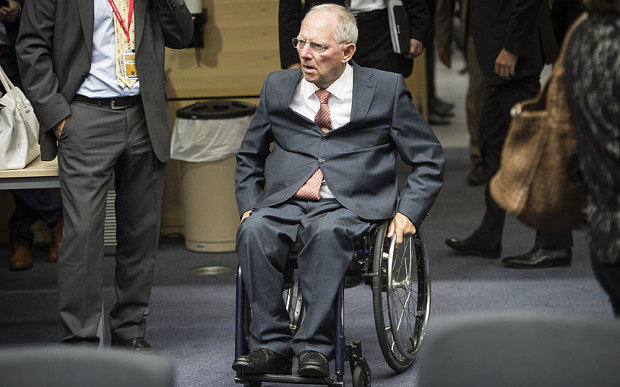Martin,
You may recollect that we met with Elisa Ferreira and Jacek Saryusz-Wolski in Strasbourg in 2012 when Elisa, he and I made the case that I had already made to Jacques Delors for joint EIB-EIF bonds for economic recovery.
At the end of the meeting you said: ‘go with this and make sure you go with it in my name’. Of which of course we were glad, and thereafter you made several statements confirming your support for Eurobonds. Emmanuel Macron also recently has said that Europe needs fiscal transfers as the basis of solidarity with peripheral or weaker member states if these are not to fall prey to reactionary nationalisms.
All of which is good in principle for Europe but has led to dismissals from Angela Merkel, Wolfgang Schäuble and Peter Tauber. But these concepts are wrong on several grounds.
For example, the European Investment Bank has issued bonds since 1958 without mutualisation of national debt, or national guarantees or fiscal transfers. Its bonds also do not count on national debt and so are not subject to macro conditionality within the terms of the Stability and Growth Pact.
This has been widely displaced at the highest level. For instance, at a meeting in Brussels in 2014 neither the economic adviser to Donald Tusk nor the advisers to Jyrki Katainen, nor to Marianne Thyssen nor the senior economic adviser to the Commission knew this. Whereas, it was immediately confirmed at the meeting by Philippe Maystadt, a former president of the European Investment Bank.
Merkel, Schäuble and Tauber therefore are also wrong in assuming that European bonds would be a liability for Germany. They no more need count on national debt than the US Treasury bonds that financed the Roosevelt New Deal – and which do not count on the debt of the states of the American Union such as California or Delaware. Nor should a common fiscal policy such as the one that serviced the New Deal bonds since EIB bonds are serviced by the projects that they finance.
Recycling global surpluses
It nonetheless is vital to distinguish bonds for mutualisation of debt from Eurobonds to foster recovery in investment and jobs and to recognise that finance for such a recovery need not come from Germany but from recycling global surpluses such as in pension funds and sovereign wealth funds that are searching for, but not finding, adequate investment outlets.
So why both EIB and EIF bonds? The European Investment Bank is project-focused and has no specific remit for recycling global surpluses. But this was a design aim for the European Investment Fund – EIF – that I recommended to Delors in 1993 and that was set up in 1994.
Macron has grasped and advocated this joint EIB-EIF recovery case in claiming, as economy minister, that this could be achieved by increasing the subscribed capital of the EIF from surpluses in the European Stability Mechanism (ESM).
On this he was blocked by Schäuble claiming that this was not the remit of the ESM which was to ensure stability, but this ignores legal advice to the European Parliament that the ESM also ‘can undertake other tasks’. As chancellor, with Emmanuel, you (Martin) could unblock this.
Antonio Guterres gained agreement at the 2000 Lisbon Council that the EIF should be part of the EIB Group. The EIB would retain project approval and monitoring for EIF Eurobond funded investments – apart from a European Venture Capital Fund, managed by the EIF in association with national and regional credit agencies and fulfilling its design remit to finance small and medium firms.
Antonio also secured adoption by the EIB in the 1987 Amsterdam Special Action Programe of a cohesion and convergence remit by which it would invest in health, education, urban regeneration and safeguarding the environment. Including projects meeting these criteria enabled it to quadruple its investment finance from 1997 to the onset of the Eurozone crisis from €22 billion to €82bn. With EIF co-funding unblocked by increasing its subscribed capital from the ESM, it could quadruple this again, approaching the investment funding equivalent of Marshall Aid.
In 2014, the Juncker Commission introduced a European Fund for Strategic Investments (EFSI) because the EIF could only offer support for small and medium firms. But, incompetently, this notion relied on reading the EIF’s website rather than its statutes. Meanwhile, EIB funding for the EFSI has been reduced from the €300bn that Jean-Claude made his top commitment to MEPs in his adoption address in June 2014 to only €5bn, plus recycled research funds.
The case now is not to scrap the EFSI but to recognize that it is not offering the feasible bond-based recovery that Juncker initially endorsed, and Europe needs, whereas joint EIB-EIF funding can. Or, more simply, Europe adding value in a manner that visibly enhances the well-being of every citizen and his or her dependants in a manner that austerity denies. Without compromising competitiveness in the sense that, unlike manufacturing or financial services, public sector provision of health, education, social services and environmental safeguards is not directly exposed to global competition. At the same time, Europe is in overall trade surplus with the rest of the world.
As initially indicated, in blocking Eurobonds, Merkel/Schäuble/Tauber are wrong in failing to see that EIB borrowing does not count on national debt and neglecting the degree to which EIF eurobonds can recycle global surpluses rather than be funded or guaranteed by Germany, France or any other EU member state.
A joint declaration by Emmanuel Macron and yourself on the feasibility of this – drawing on the Delors precedent and the Guterres extended terms of reference for the EIB – could shift the European debate on a New Deal for Europe, and the prospects for forthcoming elections in both France and Germany, onto a new plane.
Detail supporting the case made here can be found in Beyond Austerity – Democratic Alternatives for Europe, Spokesman Press, available without charge from Amazon.
* Stuart Holland was Labour MP in London Vauxhall and then adviser to Jacques Delors. He is a visiting Professor at the Faculty of Economics of the University of Coimbra and a Senior Scholar of the Institute of Social and European Studies, Köszeg, Hungary. He is author of Beyond Austerity: Democratic Alternatives for Europe (www.spokesmanbooks.com)











